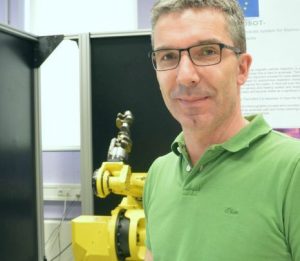IMP explores new methods and tools for improving maintenance planning and execution in highly demanding and complex production systems by intuitively guiding, supervising and optimised scheduling. This includes the following priorities: (1) detection and classification of maintenance tasks from the analysis of machine and operating data; (2) automatically deriving appropriate tasks and work instructions; (3) scheduling these tasks taking account of resources, constraints and objectives; (4) intuitive guiding workers using technologies such as augmented reality; (5) automated documentation and quality assurance by observation and interpretation the executed activities.
Background / Problem: The competitiveness of manufacturing companies is increasingly determined by the availability of plants and systems. For this reason the importance of an efficient and high quality maintenance grows rapidly. For both, breakdowns (unplanned) as well as for preventive maintenance activities (planned), downtimes must be kept short by rapid and perfect response. In other words, the right measures must be implemented at the right time using the right resources and without causing additional rework. Due to an increasing system complexity, it becomes more and more difficult to detect signs for the need of preventive maintenance as well as to derive the best possible time-slot and the ideal scope of maintenance. Subsequently, maintenance must be scheduled considering the availability of all required skills, the adherence to constraints and objectives (e. g. costs) and further executed within the given time-budget meeting all planned deadlines. Upon detection of deviations to the plan (e. g. additional tasks, longer durations, problems during recovery), affected maintenance tasks have to be altered and re-scheduled. Due to the variety of maintenance tasks and the fact that many maintenance cases occur less and less in time, maintenance activities develop more and more into unique tasks. This means that maintenance staff can build up less routine over time and frequently encounter themselves in new territories on site. At the same time, the rising time-pressure more and more prevents employees to prepare well for maintenance tasks (e. g. by reading instructions). Despite the increasing complexity and the decreasing time budget, the demand on the quality of maintenance execution rises.
Objectives / Methods: The aim of the project is the development of methods to optimize the maintenance management and operation for high-performance and high quality production systems of the future. The following methodological priorities back the project: (1) Methods for the automatic detection and classification of maintenance tasks from the analysis of machine and operating data and the interpretation of detected deviations. (2) Methods for the automatic resolution of required maintenance tasks into work steps and work instructions from stored templates. (3) Scheduling of these tasks, taking into account the required resources (e. g. qualifications), the adherence to constraints (e. g. working hours, shift patterns, deadlines) and objectives (e. g. priorities, cost factors, strategies). Triggering of the planned tasks and modifying the schedules whenever detecting deviations (e. g. delays or problems). (4) Intuitive guidance of staff in efficiently carrying out their assigned tasks in the sense of an assistance system by technologies such as augmented reality. (5) Quality assurance and supervision of the activities carried out by visual inspection and data fusion with operational data. Use of 3D object detection and tracking for inline inspection of maintenance tasks and automated deriving of corrective instructions in the case of detected deviations. (6) Learning of new work instructions from the observation and interpretation of tasks carried out successfully.
As use case for the evaluation and iterative improvement of the developed methods and procedures, the maintenance of complex machines and facilities will be used.
Results / Findings: The methods and techniques developed within this project will provide the basis for future maintenance assistance systems as well as a proof of concept. As main insights, the manageability, applicability and robustness of the chosen methods can be listed
Key Words:
maintenance, maintenance management, quality assurance, supervision, condition monitoring, scheduling, dispatching, worker-guidance, assistance systems, augmented reality, 3D image processing, SCADA, HMI
Project Name:
Intelligent Maintenance Planner & Inspection Knowledge Based Maintenance Management Systems
Funding:
FFG – IKT der Zukunft
Duration:
01.10.2014-30.09.2016


